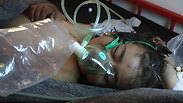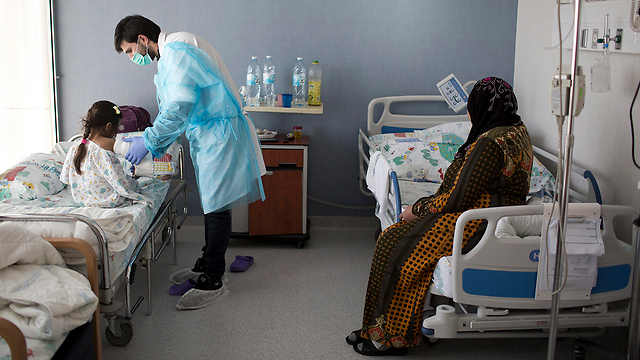
Each one of us can help a wounded Syrian child
Op-ed: If every Syrian child, woman and man, who return to their homeland after their life was saved in Israel, treasure in their hearts the human encounter with people they used to consider enemies, we may be able to dream of a better future for our children and for theirs.
Occasionally, the world is suddenly shaken by reports of an extensive massacre in Syria, deeply shocked by the images of bodies and wounded children, and does not withhold words of condemnation.
It happened again. This time, in the wake of the murder of civilians in a chemical attack in Idlib. The world was also shocked several months ago after the attack on Aleppo, when it once against remembered the suffering of Syrian people and demanded that international bodies put an end to the massacre.
We in the northern periphery, close to the borders, at the Ziv Medical Center, a public hospital, have been treating sick men, women and children from Syria for more than four years now. Most of them suffer from serious and complex wounds of war, from shooting, shrapnel and blast injuries. They arrive bleeding, with internal injuries or without their limbs. They are treated here for many months, and alongside the concern for their lives, the staff is aware of the fact that they are alone here and that they sometimes need clothes, special food and of course, words of encouragement and support.

We are with them every day. They are sad and afraid, they cry, they are far away from their families and from their country. Sometimes, they arrive here after witnessing the murder of one of their family members. Sometimes it’s a grandmother or an aunt who escorts the toddlers, as they have no parents. Sometimes it’s a teenaged girl who arrives with her wounded baby brother, barely carrying him in her arms to the Israeli border to ask for help, or two brothers on a donkey, who spent days and nights on the road, wounded and bleeding, before reaching the Israeli border.
The wounded Syrians come here for medical care and then return to Syria, to their home or what used to be a home. We welcome the Syrians like we welcome any other Israeli citizen. We save their lives, but we make sure that they not only survive, but also that their body recovers as fully as possible.
Over the years, the Ziv Medical Center has become a rehabilitation hospital against its will. If the government decided to extend a humane hand to Aleppo or Idlib, we are here. We will continue to live up to our oath as doctors and as human beings.
If every Syrian child, woman and man return to their homeland, treasuring in their hearts the human encounter which saved their lives, a memory of an embrace from people who they used to consider enemies and who turned out to be human at the most critical time, and if every Syrian who leaves us lets his experience flourish—we may then be able to dream about a better future, for our children and for theirs.
We are approaching the spring holidays—Passover for the Jews, Easter for the Christians, Ziyarat al-Nabi Shu'ayb for the Druze and the Isra and Mi'raj holiday for the Muslims. Each of us, in his or her own little acre, can help just a bit, ease the pain of at least one child, and replace the shock from the dreadful images with a good deed. This is the right place to fulfill what was said in Pirkei Avot: “In a place where there are no men, strive to be a man.”
Dr. Salman Zarka is the director of the Ziv Medical Center in Safed.
(Translated and edited by Sandy Livak-Furmanski)










